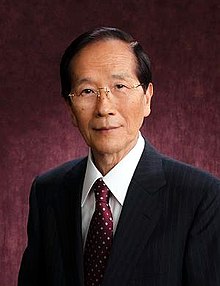Akira Endo (biochemist)
Akira Endo (遠藤 章, Endō Akira, born 14 November 1933) is a Japanese biochemist whose research into the relationship between fungi and cholesterol biosynthesis led to the development of statin drugs, which are some of the best-selling pharmaceuticals in history.
Akira Endo 遠藤章 | |
|---|---|
 Dr. Endo | |
| Born | November 14, 1933 Higashiyuri (present-day Yurihonjō, Akita) |
| Alma mater | Tohoku University, |
| Known for | discovering the first statin (HMG-CoA reductase inhibitor), paving the way for statin drug development |
| Awards | Heinrich Wieland Prize (1987) Japan Prize (2006) Massry Prize (2006) Lasker Award (2008) National Inventors Hall of Fame 2012) Canada Gairdner International Award (2017) |
| Scientific career | |
| Fields | Biochemistry |
| Institutions | Sankyo Co., Tokyo University of Agriculture and Technology |
He received the Japan Prize in 2006,[1] the Lasker-DeBakey Clinical Medical Research Award in 2008,[2] the Canada Gairdner International Award in 2017.
Biography
Endo was born on a farm in Northern Japan and had an interest in fungi even when young, being an admirer of Alexander Fleming.[3] He obtained a BA at Tohoku University (Faculty of Agriculture) in Sendai in 1957 and a PhD in biochemistry at the same university in 1966. From 1957 to 1978 he worked as a research fellow at chemical company Sankyo Co.; initially he worked on fungal enzymes for processing fruit juice. Successful discoveries in this field gained him the credit to spend two years at the Albert Einstein College of Medicine as a research associate (1966-1968),[1] working on cholesterol.[3]
His most important work in the 1970s was on fungal extrolites and their influence on cholesterol synthesis. He hypothesised that fungi used chemicals to ward off parasitic organisms by inhibiting cholesterol synthesis. The cell membranes of fungi contain ergosterol in place of cholesterol, allowing them to produce compounds that inhibit cholesterol.
Endo studied 6,000 compounds, of which three extrolites from Penicillium citrinum mold showed an effect.[4] One of them, mevastatin, was the first member of the statin class of drugs. Soon after, lovastatin, the first commercial statin, was found in the Aspergillus mold. Although mevastatin never became an approved drug, the mevastatin derivative pravastatin did.
He was an associate professor and later a full professor (1986-) at the Tokyo University of Agriculture and Technology between 1979 and 1997, and after his official retirement became the president of Biopharm Research Laboratories.[1]
Recognition
He was awarded several other prizes during his career:[1]
- Young Investigator Award in agricultural chemistry (Japan), 1966
- Heinrich Wieland Prize for the discovery of the HMG-CoA reductase inhibitors (West Germany), 1987
- Toray Science and Technology Prize (Japan), 1988
- Warren Alpert Foundation Prize (Harvard Medical School, U.S.A), 2000
- Massry Prize from the Keck School of Medicine, University of Southern California in 2006
- Lasker-DeBakey Clinical Medical Research Award, 2008
- Inducted into the National Inventors Hall of Fame, Alexandria, VA 2012[5]
- Gairdner Foundation International Award, 2017
Apart from the recognition, Endo never derived financial benefit from his discovery, despite the fact that statins are amongst the most widely prescribed medications.[3] "The millions of people whose lives will be extended through statin therapy owe it all to Akira Endo," according to Michael S. Brown and Joseph Goldstein, who won the Nobel Prize for related work on cholesterol.[6]
See also
- Aspergillus oryzae
- Medicinal molds
- Monascus purpureus
References
- The Science and Technology Foundation of Japan. Japan Prize official release Archived 2007-01-10 at the Wayback Machine, accessed 21 June 2006
- Lasker~DeBakey Clinical Medical Research Award, 2008: Akira Endo
- Landers, Peter (9 January 2006). "How One Scientist Intrigued by Molds Found First Statin". Wall Street Journal.
- Endo, Akira; Kuroda M.; Tsujita Y. (December 1976). "ML-236A, ML-236B, and ML-236C, new inhibitors of cholesterogenesis produced by Penicillium citrinium". Journal of Antibiotics. 29 (12): 1346–8. doi:10.7164/antibiotics.29.1346. PMID 1010803.
- Allen, Frederick. "The Inventors Hall of Fame Honors the Greatest Living Innovators". Retrieved May 12, 2014.
- landers, peter (2006-01-09). "How one scientist intrigued by molds found first statin". Wall Street Journal. WSJ. Retrieved May 12, 2014.